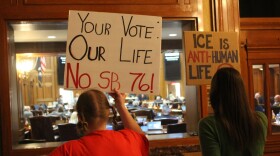-
Indiana's Senate Bill 76, a sweeping measure to align local law enforcement and public institutions with federal immigration enforcement, remains poised for final approval despite a delay in the Senate on Thursday.
-
The Chicago Bears could move to Indiana as lawmakers pass legislation aimed at securing a stadium deal for the football team.
-
Lawmakers continue to move a bill they say could connect homeless people with resources through interactions with police. The measure makes it so people can be charged with a class C misdemeanor for camping or sleeping in public areas.
-
Legislation would reshape Ivy Tech Community College governance, add workforce-focused board expertise and require research aligning degrees with employer needs.
-
Lawmakers have long considered ways to reduce township government. Legislative efforts may finally be set up to pass.
-
Indiana’s children are faring better than they were a year ago, according to an annual review of child well-being. The State of the Child presentation at the Indiana Statehouse this week highlighted new data that examines youth outcomes including health, education, economic and family factors.
-
An ICE detainee has died while in custody at the Miami Correctional Facility north of Kokomo in Indiana.
-
Lawmakers quietly added a new provision to a bill on Monday that would cut early voting days nearly in half in Indiana.
-
State lawmakers could stop the practice of limiting the number of rental houses in a neighborhood. A handful of Indiana cities have ordinances that aim to control and track rental properties.
-
The Indiana House advanced a broad immigration enforcement bill Thursday afternoon that aligns with federal immigration policies.
© 2026 Lakeshore Public Media
8625 Indiana Place
Merrillville, IN 46410
(219)756-5656
8625 Indiana Place
Merrillville, IN 46410
(219)756-5656

Play Live Radio
Next Up:
0:00
0:00
Available On Air Stations










